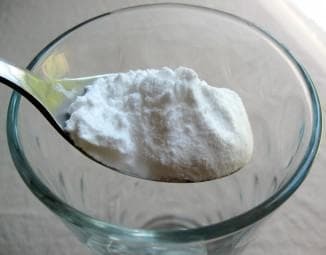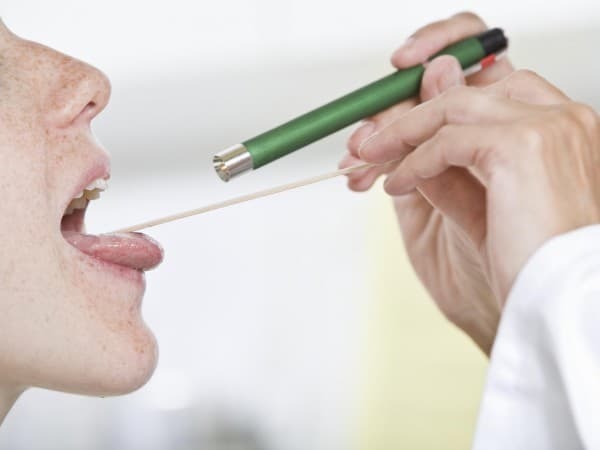
Laryngitis is an inflammation of the mucous membrane of the larynx, vocal cords. This inflammation is usually associated with a cold or infection. The disease can last as long as two weeks, acquiring a sharp form, and more than 2 weeks, turning into a chronic one. Symptoms of laryngitis may differ depending on the species, a specific treatment should be prescribed by a doctor.
Contents
- 1 Types of laryngitis
- 2 Signs and symptoms
- 3 Treatment of laryngitis at home
- 4 In hospital
- 5 Treatment with folk remedies
- 6 Consequences and complications
- 7 Video
Types of laryngitis
-
 Acute laryngitis - popularly called false croup, characterized by barking cough, attacking seizures, and lossvote. In parallel with this disease there is a disease of the nasopharynx and respiratory tract.
Acute laryngitis - popularly called false croup, characterized by barking cough, attacking seizures, and lossvote. In parallel with this disease there is a disease of the nasopharynx and respiratory tract. - Chronic laryngitis - occurs as a result of an incomplete acute form. The disease is periodically exacerbated, resulting in a catarrhal form.
- Catarrhal laryngitis may occur after an infectious disease or as an independent form. Of all forms of laryngitis - this is the easiest. Sore throat and hoarseness are the main symptoms of the disease.
- Allergic laryngitis can occur in both adults and children. This is due to seasonal manifestations or to the effect of the environment on the body.
- The atrophic form of is the heaviest and is the end result of laryngitis. The process can lead to sclerosis of the mucosa. The emerging crusts in the nasopharynx cause a lot of inconvenience.
- Hypertrophic laryngitis may occur after the appearance of the catarrhal form. Most severely, the disease affects the vocal cords.
Symptoms and symptoms

Weakness, worsening of general condition, pain when swallowing - signs of beginning laryngitis
Acute laryngitis manifests itself as a result of hypothermia, smoking, breathing through the mouth. The disease can occur within two weeks. The disease begins with weakness and deterioration of the general condition, increase in temperature. There are painful sensations when swallowing, especially painful it occurs on the back wall of the larynx .Breathing becomes much harder, the voice starts wheezing. Dryness in the throat and a feeling of scratching bother the patient.
 From this article you can learn how to treat laryngitis in children and by what methods.
From this article you can learn how to treat laryngitis in children and by what methods.
How to use cough syrup with laryngitis in children is indicated in this article.
How is the treatment of laryngitis in children at home possible to learn from this article: http: //prolor.ru/g/ bolezni-g /laringit/ lechenie-u-detej-v-domashnix-usloviyax.html
The first stage of the disease appears dry cough, and later - wet. Sometimes the voice may vanish or become rasping and hoarse. The throat will ache, the temperature will rise and will be high enough. In general, the disease lasts from 7 to 14 days.
It is necessary to exclude from use acute food, hot food, soda, since these products can irritate the throat even more. Acute laryngitis is well treated, but if you neglect the rules of treatment, then it can go into a chronic form.
 Chronic laryngitis needs to be treated long enough, you need to have patience. Occurs as a result of ingestion of an infection. Often the disease occurs in men who smoke. The main symptom for chronic laryngitis is a voice disorder or rapid fatigue as a result of conversations. Cough, which is especially intense in the morning, and hoarseness occurs first of the disease. The patient feels that there is a foreign body in the throat. If a person wants to establish a voice, trying to remove a hoarse, it will only lead to complication of the disease. Chronic laryngitis occurs in several stages. Therefore, there are other forms of laryngitis.
Chronic laryngitis needs to be treated long enough, you need to have patience. Occurs as a result of ingestion of an infection. Often the disease occurs in men who smoke. The main symptom for chronic laryngitis is a voice disorder or rapid fatigue as a result of conversations. Cough, which is especially intense in the morning, and hoarseness occurs first of the disease. The patient feels that there is a foreign body in the throat. If a person wants to establish a voice, trying to remove a hoarse, it will only lead to complication of the disease. Chronic laryngitis occurs in several stages. Therefore, there are other forms of laryngitis.
Catarrhal laryngitis occurs as a result of diffuse thickening of the membrane. But this form proceeds more easily than all other forms of laryngitis. Usually occurs against the background of other SARS.It often occurs during outbreaks of infections. It starts suddenly, there is no heat, there is discomfort in the throat. There may be frequent barking cough, discharge on coughing appear as mucus, then mucus goes along with the abscesses.

You can find infectious laryngitis after reading the article.
What antibiotics with laryngitis are most often used, you can find out by reading this article.
What medications are most commonly used for children with laryngitis can be found by reading the article here: http: //prolor.ru/g/ bolezni-g /laringit/ lechenie-u-detej-preparaty.html
In catarrhal laryngitis, the color of the vocal cords changes to bright pink or red. Mucous swelling, breathing is difficult.
Allergic laryngitis occurs as a result of the action on the body of a component. This component can be food, dust, pollen, paint, poplar fluff, medicines. This species can occur both in acute form and in chronic. The acute form of allergic laryngitis manifests itself in the morning in the form of coughing, choking, pershenia, the voice does not vanish. Such seizures are repeated all the time, but after 2 weeks they pass.
The chronic form manifests itself with the same features as the acute form. But the symptoms can occur periodically, for example, with the onset of spring. Vocal cords are affected, there is hoarseness, burning in the throat, cough.
 Atrophic laryngitis can develop long enough. Layers and the structure of the tissue varies, through the larynx shell radiating blood vessels. The swallowing reflex slowly fades, or it may even disappear as a result of the infection of the nerve endings. The number of glands of the larynx decreases, which leads to a change in the quality of mucus. At the beginning of the larynx, wrinkles are formed, which become inflamed, then there is condensation and replacement with connective tissues. They make the process of atrophy irreversible.
Atrophic laryngitis can develop long enough. Layers and the structure of the tissue varies, through the larynx shell radiating blood vessels. The swallowing reflex slowly fades, or it may even disappear as a result of the infection of the nerve endings. The number of glands of the larynx decreases, which leads to a change in the quality of mucus. At the beginning of the larynx, wrinkles are formed, which become inflamed, then there is condensation and replacement with connective tissues. They make the process of atrophy irreversible.
So that the patient's condition does not worsen, with laryngitis, he should not eat hot food, spices, drink soda.
Hypertrophic laryngitis is manifested by hoarseness, burning, cough .Excessive reproduction of mucus cells occurs. Therefore, often this diagnosis is close to the precancerous state. There is a thickening of the vocal cords, behind them are formed nodules, the pharynx has a gray-red or blue hue. There is a general weakness of the body.
Treatment of laryngitis at home

Abundant drink - the first recommendation for alleviating the condition of the patient with laryngitis
In order not to aggravate the disease, it is necessary:
- to quit smoking;
- does not strain the vocal cords;
- start eating the right foods;
- drink abundantly;
- does not overcool the throat.
Proper nutrition means the absence of acute spices in food, that is, the food should have a neutral taste.
Food should be warm, but not hot. Use of mineral water and warm tea or milk is recommended.
 What other measures need to be taken?
What other measures need to be taken?
- The place where the patient is located should be ventilated.
- The air temperature should be 20 degrees.
- Humidity is not less than 60%.
- It is prohibited to stay near tobacco smoke.
- If the disease proceeds easily, it is still better not to go out and stay at home.
What should I do to remove laryngitis?
- It is necessary to gargle throat( for example, soda throat solution) and preferably several times a day .
- Spray after spraying.
- If you feel that you are sick, then you must immediately put a warming compress, which must be changed 2 times a day.
- Carry out inhalation: breathe over a couple of potatoes or an alkaline solution.
In hospital

Laryngitis in especially neglected cases may require the intervention of a surgeon
Some forms of laryngitis need to be treated at the hospital. For example, the catarrhal form can be treated by the action of medications that are injected into the larynx. Prescribe medication and physiotherapy. If there is an acute form, then appoint a bactericidal therapy. Assign erespal, bioparox, fusafungin. If the disease is caused by an allergy, then you can not do without antihistamines. With the help of inhalations, a barking cough can be eliminated in the hospital. Mucolytics are administered by inhalation.
Running forms of laryngitis may require surgical intervention.
Especially often laryngitis is manifested in smokers, and it can lead to asphyxiation. The operation does not require long preparation, during the operation, the trachea is dissected. If the voice device has been changed or speech is broken, then plastic ligaments are carried out.
Treatment with folk remedies

Infusion of raspberry is one of the proven folk remedies for the treatment of laryngitis at home
- It is necessary to make warm foot baths every day. In the water you can add mustard, this will give faster results. It is recommended to warm your feet for about 15 minutes. Make compresses at night.
- Very effective method is the spreading of the throat with iodine and glycerol. Mix iodine and glycerin in equal proportions, take a stick with cotton wool, with which you can lubricate the throat from the inside. Be careful: the patient should not choke with cotton, so carefully press it. Spread your throat three times a day.
- Rinsing is a common treatment for laryngitis. Collect such herbs: chamomile, plantain, calendula, chop and pour a glass of boiling water 1 tablespoon. To insist the broth should be about 2 aces. Filtered infusion caress the throat 6 times a day.
-
 A good remedy for treating laryngitis is raspberry. You need to take leaves and stalks of raspberries. All dried, ground, a small amount of pour boiling water and insist for about an hour. Take should be inside 3 times a day for half a glass. Dried leaves and stems can be stored in canvas bags.
A good remedy for treating laryngitis is raspberry. You need to take leaves and stalks of raspberries. All dried, ground, a small amount of pour boiling water and insist for about an hour. Take should be inside 3 times a day for half a glass. Dried leaves and stems can be stored in canvas bags. - How to treat loss of voice with laryngitis? Mix half a glass of Borjomi and half a glass of milk, warm it up. Then add honey, butter and cognac, all in a teaspoonful. You need to drink warm.
- If the voice is completely gone, then the horse-radish will help. Take a small horseradish, pour boiling water( the third part of the glass), let it steep for 20 minutes. Add sugar( about 2 teaspoons) and drink throughout the day.
Consequences and complications of
Consequences of laryngitis can be the most serious.
Severe forms of laryngitis can provoke suffocation and death.
After an untreated disease, you can get complications in the form of stenosis and laryngospasm, you can lose your voice or get a chronic form of the disease. Also, laryngitis can gradually give complications in the form of tonsillitis or chronic bronchitis. The larynx may swell and false croup may appear. In such cases, a person can suffocate, nasolabial triangle can turn blue.
Video
Watch a video on how to recognize the signs and symptoms of laryngitis, even without leaving home:
The loss of voice, the penetration of infection into other organs, the appearance and development of cancer are all the consequences of laryngitis.
